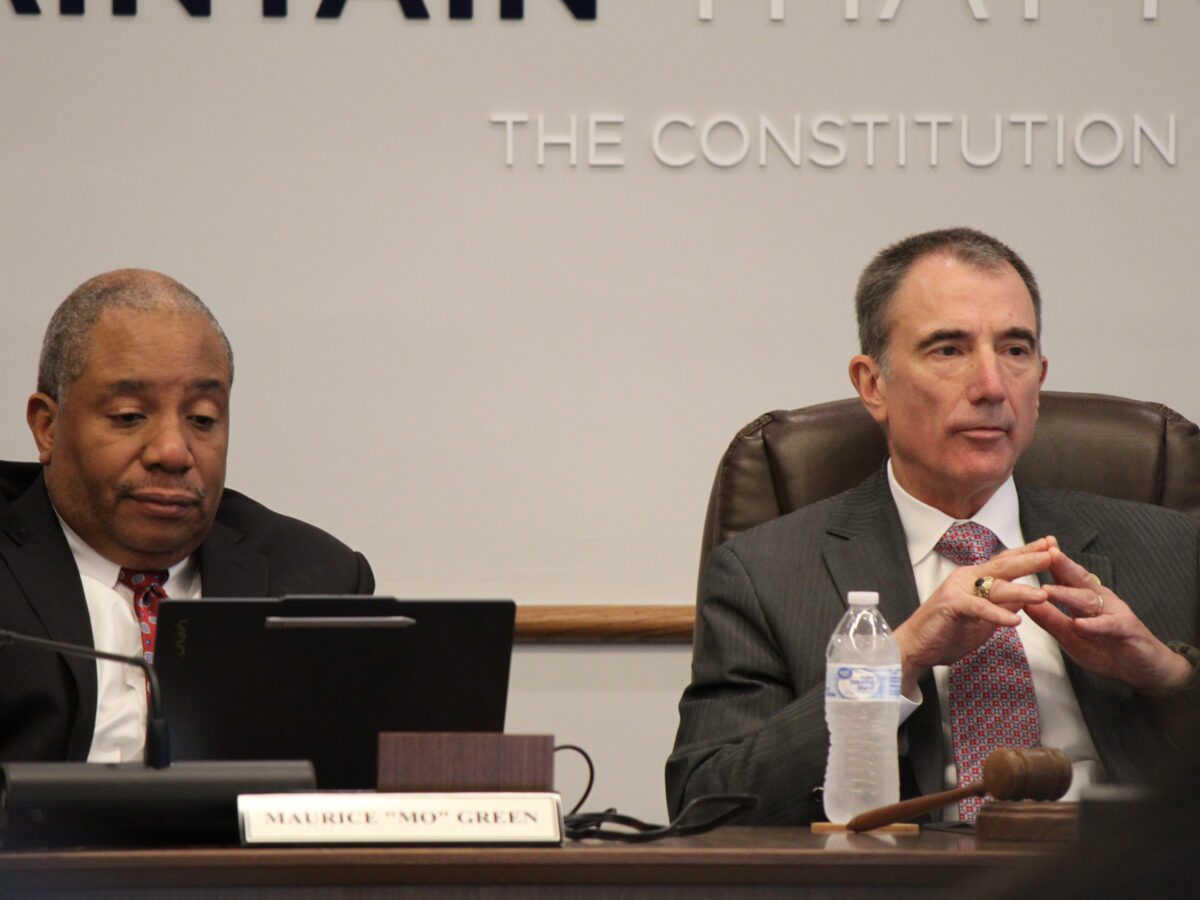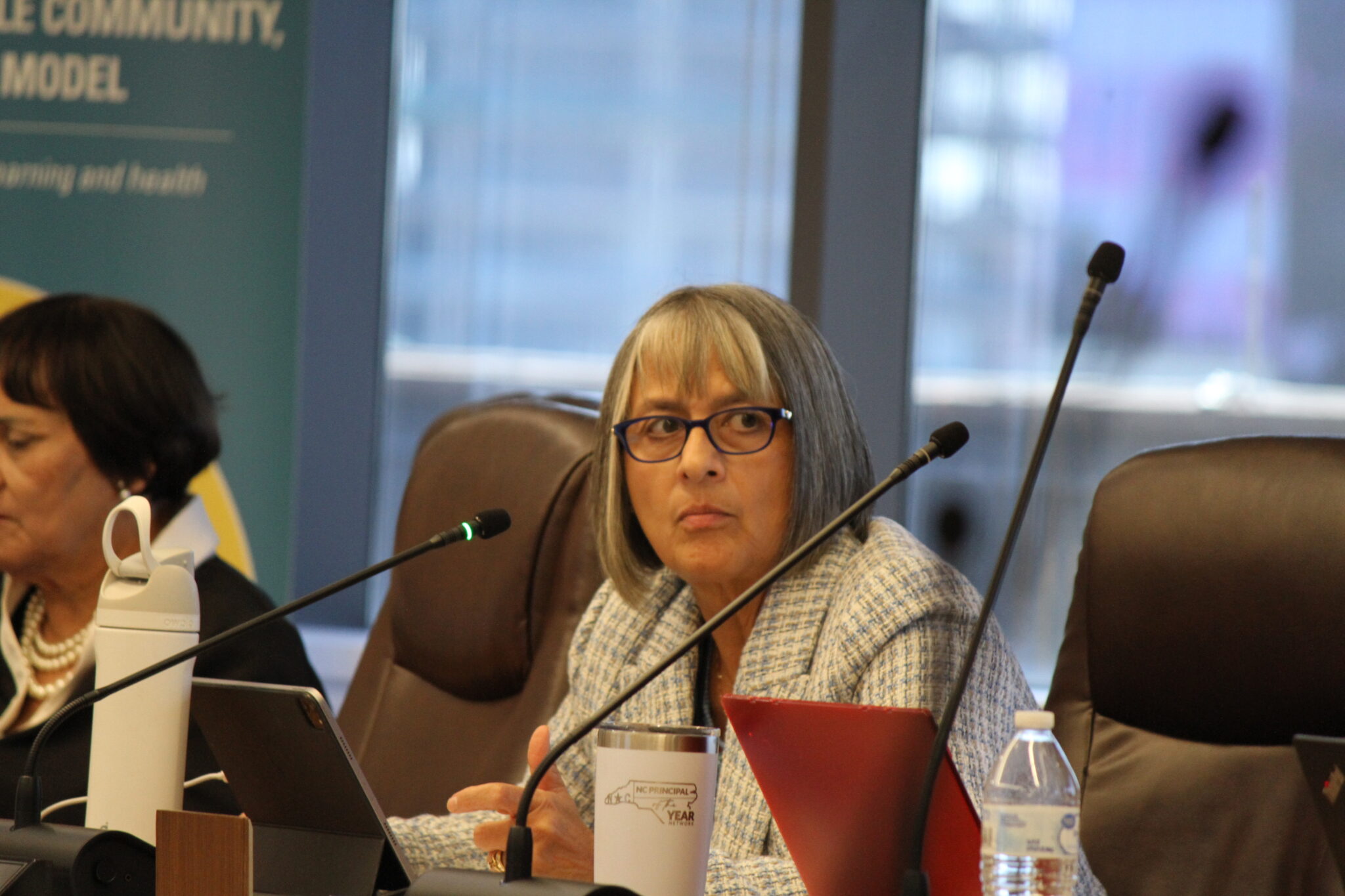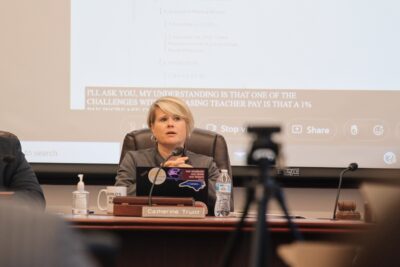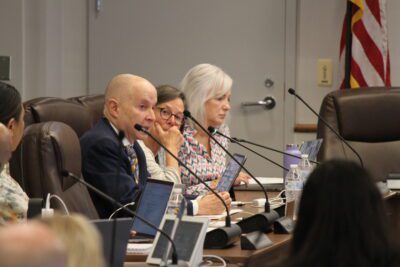
At the State Board of Education’s meeting last Thursday, the Board voted 5-4 to extend an interest-free grace period on the remaining $3.4 million debt in state funds overdrafted by Winston-Salem/Forsyth County Schools (WS/FCS). Starting Oct. 1, per the vote, interest will accrue at a rate of 0.4% per month, and on Nov. 20, the rate will rise to 1%.
WS/FCS will have to present a repayment plan on Nov. 4 and begin paying back its debt on Jan. 20, 2026.
The Board’s original motion wouldn’t have charged any interest until Nov. 20, but state Treasurer Brad Briner introduced an amendment to add the 0.4% rate starting Oct. 1. He said the amendment, which passed the Board 5-4, was “in the spirit of ‘there’s no such thing as free money.’”
Interim WS/FCS Superintendent Catty Moore, who is also a member of the Board, recused herself from the vote.
![]() Sign up for the EdDaily to start each weekday with the top education news.
Sign up for the EdDaily to start each weekday with the top education news.
Earlier in the week, the school district and its board asked the state Board to waive its policy requiring a 1% interest penalty on the remaining debt owed to DPI. WS/FCS General Counsel Dionne Tunstall Jenkins said the 1% penalty would further decrease community trust and staff morale, while increasing the reductions in force needed to rectify their budget.
“If we’re required to pay a 1% penalty on top of what is owed to the state already, then for every hull that we fix in our ship, a new one will begin to leak, and we’ll just continue to sink deeper and deeper,” she said.
Other options the school district asked the Board to consider included delaying the 1% penalty until January 2027, deferring payments on accrued penalties for 36 months, or assessing an annual penalty of 1% instead of a monthly one.
During an appeals committee meeting last Tuesday, state Superintendent Mo Green said this was the first time this Board policy had come to an appeal stage, “as best as anyone in DPI can remember.”
“I must note that the magnitude of this overdraft is unprecedented,” Green said. “And although we hope that this will be the last time that such an overdraft will occur, this will indeed set a precedent. … In light of the appeal, it is my recommendation as North Carolina Superintendent of Public Instruction that the State Board of Education find a way to balance the need to recover the remaining debt in a reasonably prompt fashion, while also recognizing the impact on the school district’s ability to continue its responsibilities to effectively educate its students.”

WS/FCS’s original $11.3 million debt to the Department of Public Instruction (DPI) was partially paid down after an allocation from Forsyth County, the district said. According to a letter sent to the Board in August, the district has no choice but to pay down the remaining $3.4 million debt over time.
In that letter, the district board said “the imposition of a monthly one percent penalty would further compound the district’s debt obligation and lengthen the amount of time it would take to repay the debt, thereby exacerbating the potential negative impact to students.”
The debt to DPI is part of a total $46 million budget deficit for 2024-45 at WS/FCS, which was first revealed earlier this year.
During the meeting on Thursday, Dr. Olivia Oxendine, a board member, said the WS/FCS financial mismanagement should serve as an example of how not to govern.
“(The WS/FCS board of education members) need to donate their monthly stipend to help pay off this bill. At a minimum,” Oxendine said.
The Board also approved an independent audit of WS/FCS internal controls, as required by state law in G.S. § 115C-447, following the release of a report by the state auditor, Dave Boliek.
As the meeting concluded, Board Chair Eric Davis said the Board wants to work with the WS/FCS board to move forward.
“Our intent is solely focused on trying to return that district to a healthy financial position, in order to carry out and deliver our constitutional responsibilities to a sound education for every student in Winston-Salem/Forsyth County Schools. That is our objective,” Davis said.
Reports to the General Assembly
The Board also approved multiple reports to be sent to the General Assembly on various topics.
Policies to improve outcomes for students with disabilities
This annual report to the General Assembly reviews data on indicators for compliance with the Individuals with Disabilities Education Act. According to a presentation by Dr. Carol Ann M. Hudgens, senior director of the Office of Exceptional Children (OEC), North Carolina was one of 37 states determined to need assistance in implementing the act.
“We recognize that there is much work still to be done to improve the outcomes of students with disabilities,” she said.
The report includes data on metrics like graduation, proficiency, gaps in proficiency rates, suspension and expulsion, and more.
The presentation highlighted some ways that the OEC is working to improve EC support, including an EC teacher support program, tuition assistance program, and recruitment fairs.
Related reads



Remote instruction plans
This annual report to the General Assembly highlights strengths, challenges, and trends noted by school districts regarding the implementation of remote instruction.
This year’s report notes readiness and communication strengths, challenges with access and connectivity, and the convergence on a small set of core tools, among other items.
“While PSUs have developed high-quality Remote Instruction Plans, challenges remain to ensure the most effective teaching and learning for NC’s public-school students,” the report says. “Overall, PSUs shared the Remote Instructions Plan components helped them to plan, communicate, and to deliver effective and quality education remotely when needed. NCDPI will continue to provide professional development opportunities, technical assistance, coaching, and instructional/programming resources, and to monitor patterns and trends”
Extended learning and integrated student supports (ELISS)
This report summarizes the ELISS program’s funded activities implemented during 2024-25.
The competitive grant program was originally funded by the 2023-2025 biennial budget, with a purpose of funding “high-quality, independently validated extended learning and integrated student support service programs for at-risk students that raise standards for student academic outcomes,” according to the Board meeting agenda.
Ensuring security of student records
This report notes the migration from PowerSchool to the Infinite Campus Student Information System (SIS), which resulted in minor changes to the way student data is collected and reported.
“In the summer of 2024, the North Carolina Department of Public Instruction (NCDPI) began the transition from PowerSchool to Infinite Campus as the statewide Student Information System (SIS). The transition was conducted in two phases. The full transition was completed in August 2025.
This change in the SIS introduced many minor adjustments to the way data is collected and reported, such as new field names or relocation to a new user-interface screen, but the underlying data elements and core reporting requirements remain consistent. This ensures continuity in data integrity and comparability, while positioning the agency to better support PSUs with enhanced tools and system capabilities.”
DPI report on the security of student records
The Board also approved two other reports: North Carolina Department of Public Instruction Implementation of The Founding Principles Act, and State Agency Mobile Device Report.
School performance grades and testing data
The Board heard presentations on Wednesday detailing trends in school performance grades and student testing data. See EdNC’s reporting below.
Policy changes to school accountability/reform model
The Board also discussed policy amendments to Restart, which is one of four models aiming to reform continually low-performing schools. Currently, Restart is the only model in use — by 27 districts, which encompasses 177 schools across North Carolina — according to a presentation to the Board.
The presentation outlined one substantive policy change, which may result in more certainty for schools about whether they need to reapply for the Restart program in a given year, and may decrease the number of schools that need to reapply.
According to the presentation, the policy change:
- Uses multiple measures, not just overall growth and achievement, to assess Academic Gain during the Restart cycle.
- Evaluates trends over multiple years instead of relying on single-year data.
- Allows consistently improving schools to continue authorization, while requiring reapplication for those consistently not showing Academic Gain.
- Aligns with the Restart School requirement for a “Continually Low Performing” designation in 2 of the past 3 years.
- Establishes the official Restart Re-Application due date.
“The Board recognized that the existing rules placed unnecessary reapplication requirements on schools that were showing improvement, while others that were struggling could continue without new oversight,” A Sept. 5 email from DPI said. “Under the updated policy, schools must now demonstrate academic gain in at least two of the three years (Years 2–4) of their Restart cycle. If they do not, they must submit an application for continued authorization by February of Year 5.”
The Board is recommending that the proposed rules be published for public comment, with final adoption anticipated in December 2025 and an effective date of Feb. 1, 2026, pending approval.
Legislative update, new grant, and more
Geoff Coltrane, senior director of government affairs at DPI, presented the Board with a legislative update. Since July 1, the beginning of the fiscal year, DPI had suspended contracts and funding allotments that were proposed to be reduced or eliminated in either the House or Senate budget bills that were being debated.
As of Sept. 2, those contracts and allotments that weren’t reduced or eliminated by the mini-budget have been resumed by DPI, according to an Aug. 19 letter sent to General Assembly leaders.
Some of the items to have their funding restored include money for Advanced Placement (AP) test fees and the Master of School Administration (MSA) stipend.
Coltrane said the letter was sent to allow legislative leaders to provide input or raise objections prior to the restoration of funding for the programs.
“They didn’t take action, we didn’t hear any concerns or objections, so as of yesterday, Sept. 2, DPI is moving forward with preparing to release those funds,” Coltrane said last Wednesday.
Last week, the Board also approved plans to provide a new Exceptional Children Competitive Grant using newfound unexpended federal funds. Public School Units (PSUs) may apply for grants for the 2025-26 school year using the guidance provided in the grant package.
The full Board meets next Oct. 1-2.
EdNC’s Hannah Vinueza McClellan contributed reporting to this article.
Recommended reading



